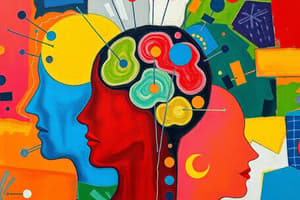Podcast
Questions and Answers
What does the IQ formula compute?
What does the IQ formula compute?
- The relationship between mental age and chronological age. (correct)
- The percentage of correct answers on an intelligence test.
- The average of test scores across a population.
- The ratio of intelligent behavior to age.
Which statement correctly describes reliability in the context of intelligence testing?
Which statement correctly describes reliability in the context of intelligence testing?
- Reliability indicates the consistency of test results over time. (correct)
- Reliability refers to the mean score achieved by participants.
- Reliability is about how well a test predicts future performance.
- Reliability measures the quality of the test items.
What type of intelligence generally increases or remains stable with age?
What type of intelligence generally increases or remains stable with age?
- Fluid intelligence
- Cognitive flexibility
- Crystallized intelligence (correct)
- Emotional intelligence
What is a cohort effect in psychological studies?
What is a cohort effect in psychological studies?
Which aspect of validity measures how well a test predicts future performance?
Which aspect of validity measures how well a test predicts future performance?
What is the main purpose of culture-fair tests?
What is the main purpose of culture-fair tests?
What is the primary concern of stereotype threat in testing contexts?
What is the primary concern of stereotype threat in testing contexts?
How does fluid intelligence typically change as people age?
How does fluid intelligence typically change as people age?
In twin studies, what is typically observed regarding IQ scores?
In twin studies, what is typically observed regarding IQ scores?
What is a significant impact of environmental influences on intelligence?
What is a significant impact of environmental influences on intelligence?
What is the definition of intelligence?
What is the definition of intelligence?
Which theory proposes that intelligence consists of both general intelligence (g) and specific abilities?
Which theory proposes that intelligence consists of both general intelligence (g) and specific abilities?
What is Fluid Intelligence (Gf)?
What is Fluid Intelligence (Gf)?
Which of the following intelligences is NOT one identified by Howard Gardner's Theory of Multiple Intelligences?
Which of the following intelligences is NOT one identified by Howard Gardner's Theory of Multiple Intelligences?
What is the primary focus of Sternberg's Triarchic Theory?
What is the primary focus of Sternberg's Triarchic Theory?
What does Emotional Intelligence (EQ) primarily involve?
What does Emotional Intelligence (EQ) primarily involve?
What is the purpose of an IQ test such as the Stanford-Binet Intelligence Test?
What is the purpose of an IQ test such as the Stanford-Binet Intelligence Test?
Which mindset portrays the belief that intelligence is static and cannot be changed?
Which mindset portrays the belief that intelligence is static and cannot be changed?
Flashcards
General Intelligence (g)
General Intelligence (g)
A general factor thought to underlie all mental abilities.
Fluid Intelligence (Gf)
Fluid Intelligence (Gf)
The ability to solve new problems without relying on past knowledge.
Crystallized Intelligence (Gc)
Crystallized Intelligence (Gc)
Accumulated knowledge and skills from experience.
Emotional Intelligence (EQ)
Emotional Intelligence (EQ)
Signup and view all the flashcards
Growth Mindset
Growth Mindset
Signup and view all the flashcards
Fixed Mindset
Fixed Mindset
Signup and view all the flashcards
Intelligence Test
Intelligence Test
Signup and view all the flashcards
Factor Analysis
Factor Analysis
Signup and view all the flashcards
Intelligence Quotient (IQ)
Intelligence Quotient (IQ)
Signup and view all the flashcards
WAIS
WAIS
Signup and view all the flashcards
Standardization
Standardization
Signup and view all the flashcards
Reliability
Reliability
Signup and view all the flashcards
Validity
Validity
Signup and view all the flashcards
Fluid Intelligence
Fluid Intelligence
Signup and view all the flashcards
Crystallized Intelligence
Crystallized Intelligence
Signup and view all the flashcards
Cohort Effect
Cohort Effect
Signup and view all the flashcards
Culture-Fair Tests
Culture-Fair Tests
Signup and view all the flashcards
Stereotype Threat
Stereotype Threat
Signup and view all the flashcards
Study Notes
Intelligence
- Intelligence is the ability to learn, solve problems, and adapt.
- General Intelligence (g) is a general factor underlying all mental abilities.
- Factor analysis supports the concept of g.
Theories of Intelligence
- Cattell-Horn-Carroll theory: intelligence comprises general intelligence (g), specific abilities, fluid intelligence (Gf), and crystallized intelligence (Gc).
- Fluid intelligence (Gf) is the ability to solve novel problems.
- Crystallized intelligence (Gc) is accumulated knowledge and skills.
- Multiple Intelligences theory (Gardner): intelligence isn't solely academic; proposes 8 relatively independent intelligences.
- Sternberg's Triarchic Theory: intelligence has three aspects: analytical, creative, and practical.
- Analytical intelligence is the ability to analyze and evaluate information.
- Creative intelligence is the ability to deal with novel situations and generate innovative ideas.
- Practical intelligence is the ability to adapt to the environment and manage everyday tasks.
- Emotional intelligence (EQ): the ability to recognize and manage one's own and others' emotions.
Measuring Intelligence
- Intelligence tests measure cognitive abilities & potential.
- Psychometric psychologists specialize in measuring cognitive traits.
- Achievement tests measure learned knowledge.
- Aptitude tests measure potential for learning.
- Mental age is a measure based on intellectual performance compared to others.
- Stanford-Binet Intelligence Test is a widely used test, calculating IQ.
- IQ = (Mental Age / Chronological Age) x 100.
- Wechsler Adult Intelligence Scale (WAIS) is a common adult intelligence test.
- Standardization ensures tests are administered and scored consistently.
- Uniform procedures maintain consistent test conditions.
- Normal curve: bell-shaped distribution of test scores.
- Restandardization updates a test's standardization sample to maintain a mean score of 100.
Reliability and Validity
- Reliability: Consistency of test results.
- Test-retest and split-half reliability assess consistency.
- Validity: The accuracy of a test's measurement.
- Predictive validity shows how well a test predicts future performance.
- Construct validity measures if the test accurately measures the intended concept.
Intelligence and Aging
- Fluid intelligence tends to decrease with age.
- Crystallized intelligence generally increases or remains stable.
- Social reasoning often improves with age.
Research Methods
- Cross-sectional studies compare different age groups at one time.
- Cohort effects influence scores due to generational factors.
- Longitudinal studies track the same individuals over time.
- Mortality effects involve participant loss in longitudinal studies.
- Testing effects are the impact of repeated testing on scores.
Intelligence and Heritability
- Heritability of intelligence ranges from 50% to 80%, representing genetic influence.
- Environmental factors, like nutrition and education, impact cognitive development.
- Twin studies support a genetic component in intelligence.
Group Differences and Bias
- Group differences in intelligence test scores exist, but not necessarily due to genetics.
- Culturally-biased test items can disadvantage individuals from other cultures.
- Culture-fair tests are designed to minimize cultural bias.
- Stereotype threat can negatively impact performance due to fear of confirming stereotypes.
- Stereotype lift: better performance due to group stereotypes.
- Educational inequities impact cognitive development and test performance.
Studying That Suits You
Use AI to generate personalized quizzes and flashcards to suit your learning preferences.




